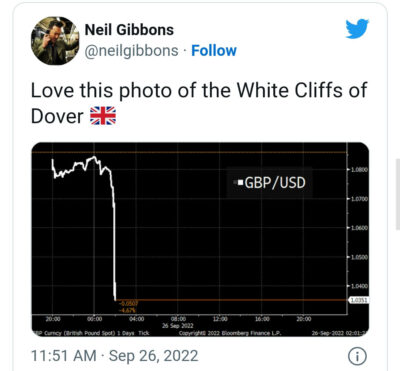From the Guardian: https://www.theguardian.com/business/2022/sep/28/rebuke-from-imf-is-a-global-embarrassment-for-truss-and-kwarteng
Liz Truss and Kwasi Kwarteng have taken on the economic orthodoxy. They have announced extra borrowing to pay for tax cuts. They have sacked the Treasury’s top mandarin. They have insisted they will press on with their dash for growth despite a hostile reaction in the markets. Now the economic orthodoxy has struck back – and in the most high-profile way possible: a public and stinging rebuke from the International Monetary Fund (IMF).
It is hard to overstate just how severe an embarrassment the dressing down from the IMF is for the government, which has been told to rethink last week’s mini-budget. The blunt language used by the IMF spokesperson was the sort normally reserved for a struggling emerging market economy seeking financial support.
The UK is not in that position. There is no immediate prospect of Kwarteng needing a bailout but the IMF’s intervention highlights just how quickly the chancellor’s strategy has unravelled. It also illustrates the IMF’s concern that a full-on financial crisis in the UK could have ripple effects through an already vulnerable global economy. The IMF has two main concerns. First, it is worried that what the Treasury is doing with tax and spending (fiscal policy) is at odds with what the Bank of England is doing with interest rates (monetary policy).
[…]
The IMF is itself taking a risk because by issuing such a public rebuke it might further undermine confidence in the UK. Kwarteng and the governor of the Bank of England, Andrew Bailey, have been trying to reassure markets and put a floor under the pound. The IMF’s intervention is not helpful to their cause, and could conceivably be the catalyst for a fresh run on the pound that would prompt emergency action from the Bank’s monetary policy committee.
Truss and Kwarteng now have a big decision to make. They can ignore the IMF’s advice, which is what they would prefer to do. Or they can bow to the mounting pressure – which is coming not only from the IMF but also from the US and German governments – and have a rapid rethink.


























